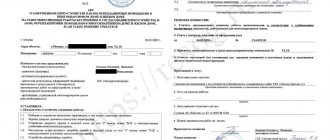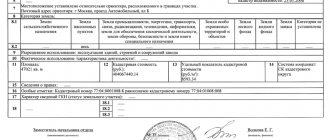When making redevelopment without the approval of supervisory authorities, the apartment owner must be prepared for a fine of up to 2.5 thousand rubles (Article 7.21 of the Code of Administrative Offenses of the Russian Federation), a legal requirement to return everything “as it was,” difficulties with selling real estate and transferring it as collateral.
There are examples in judicial practice when, after illegal redevelopment, owners lost their homes. The apartment was confiscated for improper use and mismanagement, and then sold at public auction. However, in some cases, it is possible to preserve the new appearance of the apartment by legalizing the redevelopment after it has been carried out. We’ll tell you in more detail how to do it yourself, and give step-by-step instructions and tips.
What kind of redevelopment cannot be legalized?
It is important to understand that you can only legitimize what is in principle permitted by law. You will not be able to get the go-ahead from the housing inspector if the apartment:
- a load-bearing wall was demolished;
- they installed a bathroom above the neighbor’s bedroom;
- moved the battery to the balcony;
- added a balcony to the living room;
- increased living space using common property;
- dismantled the ventilation duct;
- furnished a living room of less than 8 square meters. m and no windows.
Important! Additional prohibitions may be established by individual SNiPs and regional laws.
Doing this is strictly prohibited. Such redevelopment cannot be agreed upon either in advance or after the fact.
How to arrange redevelopment of an apartment in the Moscow region
Remodeling an apartment is a fairly common occurrence. Someone wants to combine a bathroom, someone doesn’t like the location of the doorways, but in order not to jeopardize the safety of themselves and their neighbors and not receive a fine, the redevelopment must be approved. Read about what is considered redevelopment, how to coordinate it and what to do if changes have already been made in the material of the mosreg.ru portal.
How to arrange the redevelopment of an apartment in the Moscow region. New rules>>
What is considered redevelopment
Redevelopment is a change in premises that affects the permanent structures of the building and may affect the safety of residents. Redevelopment may include the demolition of walls, the creation of new door or window openings, built-in wardrobes, the installation of additional kitchens and bathrooms, and the expansion of living space through auxiliary premises. All actions related to redevelopment are specified in detail in Article 25 of the Housing Code of the Russian Federation.
Before redevelopment begins, it must be approved. Otherwise, it will be recognized as unauthorized and the owners and tenants of the residential premises may be brought to administrative liability.
Speaking about redevelopment, it is important to understand that cosmetic repairs, replacement of engineering equipment with similar ones, reinstallation of an electric stove, heating and gas appliances (if this does not require laying additional networks), and installation of air conditioners do not apply to it. These actions do not need to be coordinated.
Where to go
Redevelopment of residential premises is carried out by interdepartmental commissions, which are created by local governments. All these commissions have representatives of the Moscow Regional Bureau of Technical Inventory, who help prepare the necessary package of documents for registration of redevelopment.
In order to save time, you can immediately contact MOBTI; specialists will tell you how best to proceed in each specific case, and clarify whether the activities you are going to carry out are redevelopment. However, the final decision on issuing permission for redevelopment is made by local governments.
What documents are needed
To complete the redevelopment, you will need the following documents:
- application for redevelopment;
- title documents for residential premises;
- reconstruction or redevelopment project;
- technical passport of the apartment;
- conclusion of the body for the protection of architectural, historical and cultural monuments on the admissibility of the planned changes (if the house is of historical value).
Coordination with the commission
Local authorities must issue permission for redevelopment within 45 days. However, after completion of the redevelopment work, you will have to contact the interdepartmental municipal commission again. She will check how the work has been carried out, whether it corresponds to the approved plan, and, if everything is in order, she will issue documents with a new apartment passport.
How to legalize an existing redevelopment
If the redevelopment has already been done, then it must be legalized, otherwise the owner will face a fine.
It is more difficult to legitimize unauthorized redevelopment than to approve a planned one. You will need to contact MOBTI with your passport and documents for the apartment so that the fact of redevelopment is recorded. After this, you need to go to the district court, win it, get permission, and then act in the same way as when approving the planned redevelopment.
To submit to the court you will need the following documents:
- statement;
- technical design of the completed redevelopment;
- technical passport of the apartment;
- certificate of ownership.
Read how to register real estate in the Moscow region>>
Victoria Kulagina
How to change the layout legally?
The easiest way to legally redevelop an apartment is to contact a specialized company.
Such organizations have practical experience in carrying out redevelopment and reconstruction, have information about the possibility of carrying out certain changes, and are familiar with all the nuances of the stages of approval by the competent authorities (Rospotrebnadzor, SES, architectural and planning department and fire supervision). Before ordering a project, you should check that the selected company is a member of a self-regulatory organization (SRO) and has an SRO permit - a document confirming the company’s right to conduct construction activities legally. If the home owner decides to do the redevelopment or reconstruction on his own, he will need to go through all the approval procedures himself.
Here are the basic steps:
Study the list of permitted and unauthorized changes in residential premises.
Draw up a redevelopment or reconstruction project.
Collect documentation to approve changes.
The following documents are required: • application of the established form; • identification document; • title documents for the premises (certificate of ownership or extract from the Unified State Register of Real Estate); • technical passport (the document can be requested from the BTI); • written consent of all owners of the premises to the upcoming changes.
It is possible to expand the list of documents at the request of the approving body. The list of documents may also vary in different regions of the Russian Federation.
Submit documents for approval of changes to the MFC
Original documents or their copies certified by a notary are provided. It is also possible to submit an application online on the government services portal. In this case, scanned copies of documents are attached.
The application review period is up to 45 days. Refusal to approve changes can be appealed in court within 3 months from the date of notification of the refusal.
If the changes are approved, implementation can begin.
Do not delay the work, as the permit is valid for 1 year. During this period, you need to have time to carry out repair work and submit an application for a certificate of completion. The permit can be extended once for no more than 6 months.
After completing all repair or construction work, you must contact the approval body to draw up an acceptance committee report on the completion of the reconstruction or redevelopment.
The last step in legitimizing the redevelopment or reconstruction is the sending of the acceptance committee’s act by the approval body to Rosreestr.
Rosreestr, within 15 working days from the date of receipt of the acceptance committee’s act, enters updated information about the property into the Unified State Register of Real Estate.
The stages of approval and redevelopment take a lot of time, but they should not be neglected. This will allow you to avoid administrative liability (fines), bringing the apartment to its original form and other undesirable consequences.
Draw up a certificate of completed redevelopment of premises
1. The applicant has the right to file a pre-trial (extrajudicial) complaint against the decisions and (or) actions (inactions) taken (performed) in the provision of public services by the Moscow Housing Inspectorate, the State Budgetary Institution of the MFC of the city of Moscow and their officials, state civil servants of the Moscow Housing Inspectorate, and employees of the MFC.
2. The filing and consideration of complaints is carried out in the manner established by Chapter 2.1 of the Federal Law of July 27, 2010 No. 210-FZ “On the organization of the provision of state and municipal services”, the Regulations on the specifics of filing and consideration of complaints about violations of the procedure for the provision of public services in the city of Moscow , approved by Decree of the Moscow Government of November 15, 2011 No. 546-PP “On the provision of state and municipal services in the city of Moscow”, these Regulations.
3. Applicants may file complaints in the following cases:
3.1. Violation of the deadline for registering a request and other documents necessary for the provision of public services, as well as the procedure for processing and issuing a receipt for receiving documents (information) from the applicant in the cases provided for by these Regulations.
3.2. Requirements from the applicant:
3.2.1. Documents or information or the implementation of actions, the provision or implementation of which is not provided for by the regulatory legal acts of the Russian Federation and the city of Moscow for the provision of public services, including documents obtained using interdepartmental information interaction.
3.2.2. Applications for the provision of services not included in the list of services approved by the Moscow Government that are necessary and mandatory for the provision of public services.
3.2.3. Payment of fees for the provision of public services not provided for by regulatory legal acts of the Russian Federation and the city of Moscow.
3.2.4. Documents or information, the absence and (or) unreliability of which was not indicated during the initial refusal to accept documents necessary for the provision of a public service, or in the provision of a public service, except for the cases provided for in paragraph 4 of part 1 of Article 7 of the Federal Law of July 27, 2010 No. 210-FZ “On the organization of the provision of state and municipal services.”
3.3. Violations of the deadline for the provision of public services.
3.4. Refusal to the applicant:
3.4.1. In accepting documents, the submission of which is provided for by the regulatory legal acts of the Russian Federation and the city of Moscow for the provision of public services, on grounds not provided for by the regulatory legal acts of the Russian Federation and the city of Moscow.
3.4.2. In the provision of public services on grounds not provided for by the regulatory legal acts of the Russian Federation and the city of Moscow.
3.4.3. In the correction of typographical errors and errors in documents issued as a result of the provision of public services, or in case of violation of the established deadline for such corrections.
3.5. Other violations of the procedure for providing public services established by regulatory legal acts of the Russian Federation and the city of Moscow.
4. Complaints about decisions and (or) actions (inaction) of officials, state civil servants of the Moscow Housing Inspectorate are considered by the head (authorized deputy head) of the Moscow Housing Inspectorate.
Complaints about decisions and (or) actions (inaction) of the head of the Moscow Housing Inspectorate, including decisions made by him or his deputy on complaints received in a pre-trial (extrajudicial) manner, are considered by a higher executive body of the city of Moscow in accordance with paragraphs 5.6, 6 of the appendix 6 to the resolution of the Moscow Government of November 15, 2011 N 546-PP “On the provision of state and municipal services in the city of Moscow.”
Complaints about decisions and (or) actions (inaction) of MFC employees committed when providing government services in accordance with the interaction agreement concluded with the Moscow Housing Inspectorate are considered by the director (authorized deputy director) of the State Budgetary Institution of the MFC of the city of Moscow.
Complaints about decisions and (or) actions (inaction) of the director (authorized deputy director) of the State Budgetary Institution of the MFC of the city of Moscow, accepted on complaints received in a pre-trial (extrajudicial) manner, are considered by a higher executive body of the city of Moscow in accordance with paragraphs 5.6, 6 of Appendix 6 to Resolution of the Moscow Government of November 15, 2011 No. 546-PP “On the provision of state and municipal services in the city of Moscow.”
5. Complaints can be submitted to the executive authorities of the city of Moscow and organizations subordinate to them authorized to consider complaints in accordance with these Regulations (hereinafter referred to as the bodies and organizations authorized to consider complaints), in writing on paper, in electronic form in one from the following methods:
5.1. Upon personal application by the applicant (applicant’s representative).
5.2. Through MFC.
5.3. By post.
5.4. Using the official website of the Moscow Housing Inspectorate on the information and telecommunications network Internet.
6. The complaint must contain:
6.1. The name of the body (organization) authorized to consider the complaint or the position and (or) last name, first name and patronymic (if any) of the relevant official to whom the complaint is sent.
6.2. The name of the executive authority of the city of Moscow, a multifunctional center for the provision of public services, or the position and (or) surname, first name, patronymic (if any) of the official, civil servant, employee, decisions and (or) actions (inaction) of which are being appealed.
6.3. Last name, first name, patronymic (if any), information about the place of residence of the applicant - an individual, including one registered as an individual entrepreneur, or name, information about the location of the applicant - a legal entity, as well as contact telephone number(s), address (addresses) email (if available) and postal address to which the response should be sent to the applicant.
6.4. The date of submission and registration number of the request for the provision of a public service (except for cases of appealing against the refusal to accept the request and its registration).
6.5. Information about decisions and (or) actions (inactions) that are the subject of appeal.
6.6. Arguments on the basis of which the applicant does not agree with the decisions and actions (inactions) being appealed. The applicant may submit documents (if any) confirming the applicant’s arguments, or copies thereof.
6.7. Applicant's requirements.
6.8. List of documents attached to the complaint (if any).
6.9. Date of filing the complaint.
7. The complaint must be signed by the applicant (his representative). If a complaint is filed in person, the applicant (applicant's representative) must provide an identification document.
The authority of the representative to sign the complaint must be confirmed by a power of attorney issued in accordance with the regulatory legal acts of the Russian Federation.
The powers of a person acting on behalf of an organization without a power of attorney on the basis of the law, other regulatory legal acts and constituent documents are confirmed by documents certifying his official position, as well as the constituent documents of the organization.
The status and powers of legal representatives of an individual are confirmed by documents provided for by regulatory legal acts of the Russian Federation.
8. A received complaint must be registered no later than the working day following the day of receipt.
9. The maximum period for consideration of a complaint is 15 working days from the date of its registration. The period for consideration of the complaint is five working days from the date of its registration in cases of appeal by the applicant:
9.1. Refusal to accept documents.
9.2. Refusal to correct typos and errors made in documents issued as a result of the provision of public services.
9.3. Violations of the deadline for correcting typos and errors.
10. Based on the results of consideration of the complaint, a decision is made to satisfy it (in whole or in part) or to refuse satisfaction.
11. The decision must contain:
11.1. The name of the body or organization that considered the complaint, position, surname, first name, patronymic (if any) of the official who made the decision on the complaint.
11.2. Details of the decision (number, date, place of adoption).
11.3. Last name, first name, patronymic (if any), information about the place of residence of the applicant - an individual, including one registered as an individual entrepreneur, or the name, information about the location of the applicant - a legal entity.
11.4. Last name, first name, patronymic (if any), information about the place of residence of the applicant’s representative who filed the complaint on behalf of the applicant.
11.5. Method of filing and date of registration of the complaint, its registration number.
11.6. Subject of the complaint (information about the decisions, actions, or inactions being appealed).
11.7. The circumstances established during the consideration of the complaint and the evidence confirming them.
11.8. Legal grounds for making a decision on a complaint with reference to the applicable regulatory legal acts of the Russian Federation and the city of Moscow.
11.9. The decision taken on the complaint (conclusion on the satisfaction of the complaint or refusal to satisfy it).
11.10. Measures to eliminate identified violations and deadlines for their implementation (if the complaint is satisfied).
11.11. Information about the actions carried out by the executive authority of the city of Moscow, the local government body, an organization subordinate to the executive authority and the local government body that provides public services, the MFC in order to immediately eliminate identified violations in the provision of public services, as well as apologies for the inconvenience caused and information about further actions that the applicant needs to take in order to receive public services (if the complaint is satisfied).
11.12. Reasoned explanations about the reasons for the decision made (in case of refusal to satisfy the complaint).
11.13. Procedure for appealing a decision.
11.14. Signature of the authorized official.
12. The decision is made in writing using official forms.
13. The measures to eliminate identified violations specified in the decision include:
13.1. Cancellation of previously made decisions (in whole or in part).
13.2. Ensuring the acceptance and registration of the request, execution and issuance of a receipt to the applicant (in case of evasion or unreasonable refusal to accept documents and their registration).
13.3. Ensuring registration and delivery to the applicant of the result of the provision of a public service (in case of evasion or unreasonable refusal to provide a public service).
13.4. Correction of typos and errors made in documents issued as a result of the provision of public services.
13.5. Refund to the applicant of funds, the collection of which is not provided for by the regulatory legal acts of the Russian Federation and the city of Moscow.
14. The body or organization authorized to consider the complaint refuses to satisfy it in the following cases:
14.1. Recognition of the appealed decisions and (or) actions (inactions) as legal and not violating the rights and freedoms of the applicant.
14.2. Filing a complaint by a person whose powers have not been confirmed in the manner established by regulatory legal acts of the Russian Federation and the city of Moscow.
14.3. The applicant does not have the right to receive public services.
14.4. Availability:
14.4.1. A judicial act on the applicant’s complaint with identical subject matter and grounds that has entered into legal force.
14.4.2. Decisions on a complaint made earlier in a pre-trial (out-of-court) manner in relation to the same applicant and on the same subject of the complaint (except for cases of appealing previously made decisions to a higher authority).
15. The complaint must be left unanswered on its merits in the following cases:
15.1. The presence in the complaint of obscene or offensive language, threats to the life, health and property of officials, as well as members of their families.
15.2. If the text of the complaint (part of it), last name, postal address and email address are not readable.
15.3. If the complaint does not indicate the name of the applicant (the applicant's representative) or the postal address and email address to which the response should be sent.
15.4. If the body or organization authorized to consider the complaint received a request from the applicant (the applicant’s representative) to withdraw the complaint before a decision on the complaint is made.
16. The decision to satisfy the complaint or to refuse to satisfy the complaint is sent to the applicant (the applicant’s representative) no later than the working day following the day of its adoption, to the postal address specified in the complaint. At the request of the applicant, the decision is also sent to the email address specified in the complaint (in the form of an electronic document signed with the electronic signature of an authorized official). In the same manner, the applicant (the applicant’s representative) is sent a decision on the complaint, in which only an email address is indicated for the response, and the postal address is missing or cannot be read.
17. If the complaint is left unanswered on the merits, the applicant (his representative) is sent, no later than the working day following the day of registration of the complaint, a written motivated notification indicating the grounds (except for cases where the postal address and email address are not indicated in the complaint email for a response or they are unreadable). The notice is sent in the manner established for sending a decision on a complaint.
18. A complaint filed in violation of the rules on competence provided for in paragraph 5.4 of these Regulations is sent no later than the working day following the day of its registration to the body authorized to consider the complaint, with simultaneous written notification to the applicant (his representative) about the redirection complaints (except for cases where the complaint does not indicate a postal address and email address for a response or they are not legible). The notice is sent in the manner established for sending a decision on a complaint.
19. Filing a complaint in a pre-trial (out-of-court) manner does not exclude the right of the applicant (applicant’s representative) to simultaneously or subsequently file a complaint in court.
20. Informing applicants about the judicial and pre-trial (extrajudicial) procedure for appealing decisions and (or) actions (inactions) committed in the provision of public services should be carried out by:
20.1. Placing relevant information on the Portal of state and municipal services (functions) of the city of Moscow and stands, and other sources of information in places where public services are provided.
20.2. Consulting applicants, including by telephone, email, and in person.
21. If, during or as a result of consideration of a complaint, signs of an administrative offense or crime are established, the official empowered to consider the complaint immediately forwards the available materials to the prosecutor's office.
If violations of the procedure for the provision of public services of the city of Moscow are identified, the responsibility for which is established by the Code of the City of Moscow on Administrative Offenses, the official empowered to consider the complaint must also send copies of the available materials to the Main Control Department of the city of Moscow within two working days following after the day the decision on the complaint was made (but no later than the working day following the day of expiration of the period established by federal legislation for consideration of complaints about violations of the procedure for the provision of public services).









